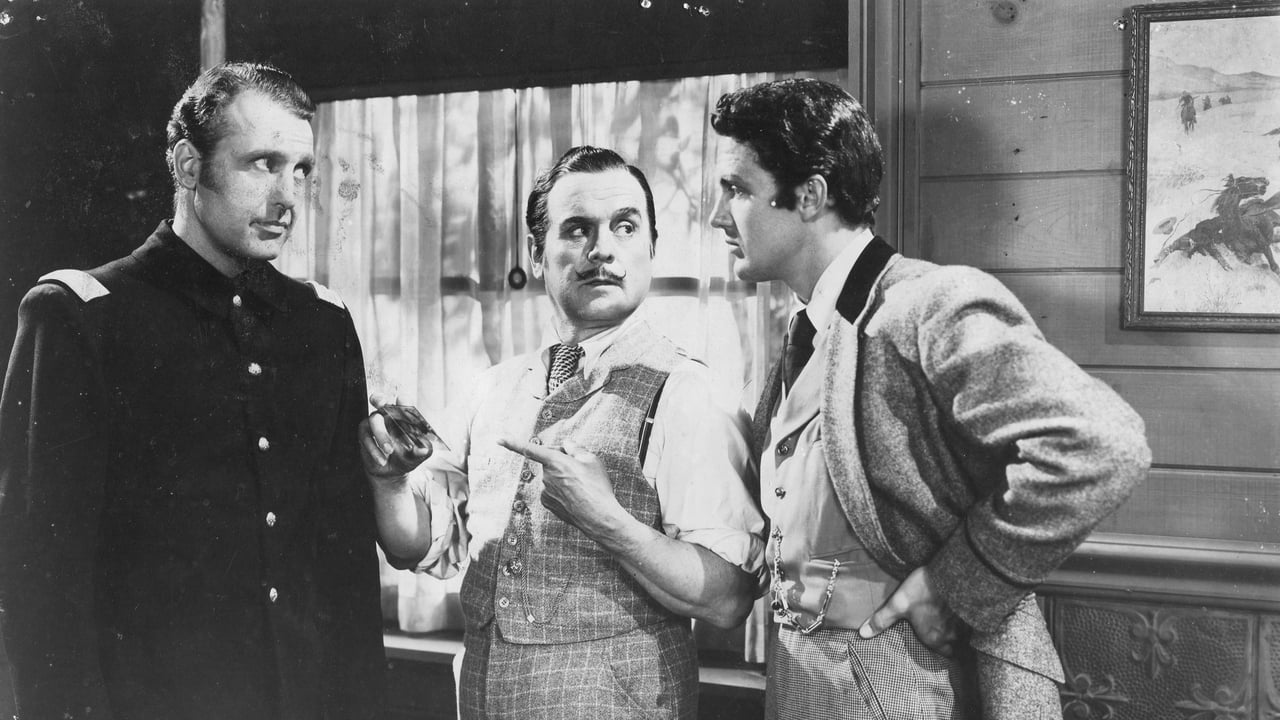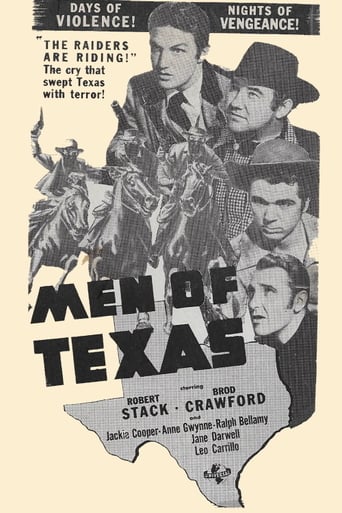Majorthebys
Charming and brutal
BallWubba
Wow! What a bizarre film! Unfortunately the few funny moments there were were quite overshadowed by it's completely weird and random vibe throughout.
PiraBit
if their story seems completely bonkers, almost like a feverish work of fiction, you ain't heard nothing yet.
Lucia Ayala
It's simply great fun, a winsome film and an occasionally over-the-top luxury fantasy that never flags.
Ray Faiola
Beginning with DESTRY RIDES AGAIN in 1939, Universal ushered in a series of A and B westerns - not including their regular programmers that starred Johnny Mack Brown and Tex Ritter - with a galaxy of contract and on-loan players. These pictures included WHEN THE DALTONS RODE, TRAIL OF THE VIGILANTES, BADLANDS OF DAKOTA, and MEN OF Texas. All of these were written, either story and/or screenplay, by Harold Shumate (who also penned Universal's Abbott and Costello western RIDE 'EM COWBOY). Of the lot, MEN OF Texas is decidedly the weakest. With a story by Shumate and screenplay by Richard Brooks, MEN OF Texas is an attempt at pro-American propaganda in the garb of a story about post-Civil War rebellion in Texas. The problem is that the story is too big to be tackled in a (barely) nine-reeler. There is too much talk and not enough action. Much of the action footage is stock and a lot of the picture simply doesn't make sense. Bob Stack is a reporter held hostage by raider/bandit Brod Crawford, who forces the scribe to write glowing tales of Brod as a heroic revolutionary. The "fortress" for these raiders is an old shack with a couple of crates of rifles in the back room. The cast is fine but the dialogue is curious and character motivations are often illogical. John Litel's final speech is anything but stirring or inspiring (especially when you remember him at Warners thundering "Give me liberty or give me death!") and the idea of an unrepentant Brod Crawford hearing Sam Houston's spirit before falling through a trap door was ludicrous.It's fine when logic is thrown aside in a straightforward shoot-em-up or sagebrush saga, but when questions of statehood, national patriotism, manipulation of the press are brought to bear, a bit more care must be taken in the scripting.Fortunately, MEN OF Texas was directed by Ray "Speedy" Enright and his usual Bacon-like pacing does not give the viewer enough time to ask too many questions until after the End Cast has played out. Edward Ward was an unusual choice for the score but, again, this was an off-the-beaten track western. Ward's long sustained lines midst quick wagon rides almost defeat Enright's efforts to ratchet the pace.For Universal completists, this is definitely worth a look. And it is a good example of how a factory with a sure-fire mold could miss in so many ways when they try to break out of it.Interesting casting note - the barber is played by J. Frank Hamilton, who would later be billed as John F. Hamilton. He is most famous for playing Eva Marie Saint's father in ON THE WATERFRONT.
Penfold-13
Made in 1942, a film about patriotism is necessarily going to be a pro-Union all-American affair, as this B movie undoubtedly is.Played by Robert Stack, Barry Conovan, a newspaperman, is sent to Texas some years after the death of Sam Houston, with the aim of getting the real skinny on the grand old man. He unearths some facts which make Houston more heroic than had been thought up North before, and then gets involved, and ultimately held hostage by Broderick Crawford's Henry Clay Jackson,.Jackson is a Texan rebel, but Conovan discovers that he is no noble freedom-fighter, opting instead for robbing banks to fill his own pockets rather than for the greater glory of Texas.The drums of patriotism beat loudly throughout the rather leaden script, which is flairlessly uttered by the second class actors.Unless you happen to be a rabid Texas chauvinist who still thinks the Lone Star State is illegally occupied, the film is wholly inoffensive and passes the time. But it really is very ordinary.

